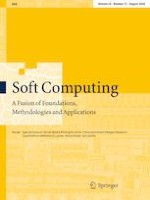07-01-2020 | Methodologies and Application
Dependency-aware software release planning through mining user preferences
Published in: Soft Computing | Issue 15/2020
Log inActivate our intelligent search to find suitable subject content or patents.
Select sections of text to find matching patents with Artificial Intelligence. powered by
Select sections of text to find additional relevant content using AI-assisted search. powered by
